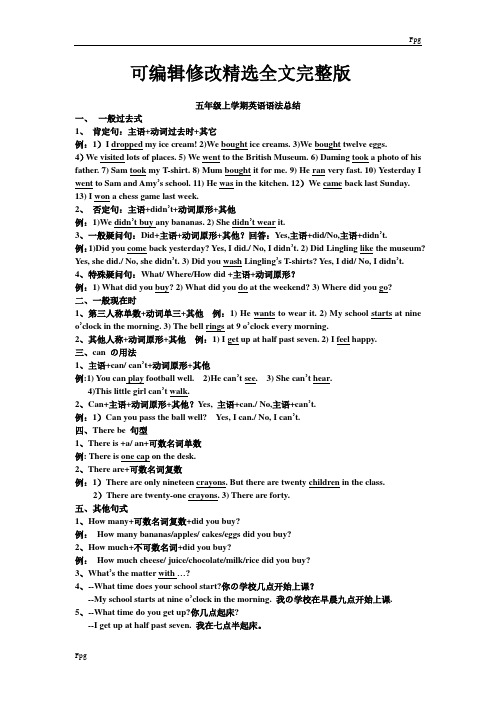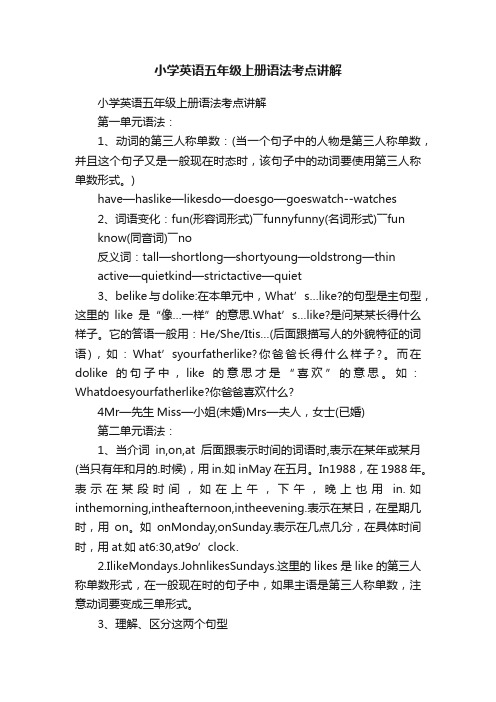五年级上册英语语法(精品)
五年级上册英语语法总结

【导语】有⼈说:“⼈⼈都可以成为⾃⼰的幸运的建筑师。
”愿你们在前⾏的道路上,⽤⾃⼰的双⼿建造幸运的⼤厦。
以下是为⼤家整理的《五年级上册英语语法总结》供您查阅。
1.intheforest在森林⾥2.thewomaninyellow穿着黄⾊⾐服的⼥⼈3.hungryandthirsty⼜饿⼜渴4.somesouponthetable在桌上的⼀些汤5.justright正好6.infrontofher在她前⾯7.rememberthesewords记住这些单词8.putonyourcoats穿上你们的外套9.bepopular流⾏的,受欢迎的10.inWesterncountries在西⽅国家11.inChina在中国12.inthekitchen在厨房⾥13.onNancy'snewT-shirt在南希的新T恤上14.findtheircousin找到他们的表妹15.inthelivingroom在客厅⾥16.threecolourfulumbrellas三把彩⾊的伞17.talkaboutthingsinaplace谈论在⼀个地⽅的事物18.infrontoftheclassroom在教室前⾯19.behindthedoor在门后20.betweenthetwobigtrees在这两棵⼤树之间21.thelittlecook.⼩厨师22.timeforlunch午饭时间23.sleeponthebed在床上睡觉24.threebowlsofsoup三碗汤25.gotothediningroom去餐厅26.ontheteacher'sdesk在讲台上27.abigandcleanclassroom⼀个⼜⼤⼜⼲净的教室28.apictureofHelen'sfamily⼀张海伦家⼈的照⽚句⼦1.Godilocksisintheforest⾦发⼥孩在森林⾥。
2.Whatabeautifulhouse!多么漂亮的⼀座房⼦啊!Whatbeautifulhouses!多么漂亮的房⼦啊!3.Thereissomesouponthetable.在桌上有⼀些汤。
外研版(三年级起点)五上语法总结精选全文完整版

可编辑修改精选全文完整版五年级上学期英语语法总结一、一般过去式1、肯定句:主语+动词过去时+其它例:1)I dropped my ice cream! 2)We bought ice creams. 3)We bought twelve eggs.4)We visited lots of places. 5) We went to the British Museum. 6) Daming took a photo of his father. 7) Sam took my T-shirt. 8) Mum bought it for me. 9) He ran very fast. 10) Yesterday I went to Sam and Amy’s school. 11) He was in the kitchen. 12)We came back last Sunday. 13) I won a chess game last week.2、否定句:主语+didn’t+动词原形+其他例:1)We didn’t buy any bananas. 2) She didn’t wear it.3、一般疑问句:Did+主语+动词原形+其他?回答:Yes,主语+did/No,主语+didn’t.例:1)Did you come back yesterday? Yes, I did./ No, I didn’t. 2) Did Lingling like the museum? Yes, she did./ No, she didn’t. 3) Did you wash Lingling’s T-shirts? Yes, I did/ No, I didn’t.4、特殊疑问句:What/ Where/How did +主语+动词原形?例:1) What did you buy? 2) What did you do at the weekend? 3) Where did you go?二、一般现在时1、第三人称单数+动词单三+其他例:1) He wants to wear it. 2) My school starts at nine o’clock in the morning. 3) The bell rings at 9 o’clock every morning.2、其他人称+动词原形+其他例:1) I get up at half past seven. 2) I feel happy.三、can の用法1、主语+can/ can’t+动词原形+其他例:1) You can play football well. 2)He can’t see. 3) She can’t hear.4)This little girl can’t walk.2、Can+主语+动词原形+其他?Yes, 主语+can./ No,主语+can’t.例:1)Can you pass the ball well? Yes, I can./ No, I can’t.四、There be 句型1、There is +a/ an+可数名词单数例: There is one cap on the desk.2、There are+可数名词复数例:1)There are only nineteen crayons. But there are twenty children in the class.2)There are twenty-one crayons. 3) There are forty.五、其他句式1、How many+可数名词复数+did you buy?例:How many bananas/apples/ cakes/eggs did you buy?2、How much+不可数名词+did you buy?例:How much cheese/ juice/chocolate/milk/rice did you buy?3、What’s the matter with …?4、--What time does your school start?你の学校几点开始上课?--My school starts at nine o’clock in the morning. 我の学校在早晨九点开始上课.5、--What time do you get up?你几点起床?--I get up at half past seven. 我在七点半起床。
五年级上册英语重点句型语法

五年级上册英语重点句型语法以下是五年级上册英语的重点句型和语法:重点句型:1. What day is it today? 今天是星期几?2. What do you have on Thursdays? 星期四你们有什么课?3. What do you do on the weekend? 你周末做什么?4. When is your birthday? 你的生日是什么时候?5. My birthday is in June. 我的生日在六月。
6. We have English, math and science on Mondays. 星期一我们有英语、数学和科学课。
7. I like Thursdays because I have music and computer on Thursdays. 我喜欢星期四,因为星期四我有音乐和电脑课。
8. When is the school trip? 学校郊游是什么时候?9. It’s in October. 在十月。
10. I often have a PE class on Wednesdays. 我经常在星期三有一节体育课。
重点语法:1. 现在进行时:表示正在进行的动作或正在发生的事情。
结构为“be动词+动词ing”。
例如:“I am playing football now.”(我现在正在踢足球。
)2. 频度副词:表示动作发生的频率,如“always”、“usually”、“often”、“sometimes”、“never”等。
例如:“I usually have dinner at 7:00.”(我通常在7点吃晚饭。
)3. 时间介词:表示时间的前后关系,如“in”、“on”、“at”。
例如:“I have English class at 8:00 ”(我上午8点有英语课。
)4. 星期名词:星期一至星期日的英文表达方式。
例如:“I go to school on Monday.”(星期一我去上学。
小学英语五年级上册语法考点讲解

小学英语五年级上册语法考点讲解小学英语五年级上册语法考点讲解第一单元语法:1、动词的第三人称单数:(当一个句子中的人物是第三人称单数,并且这个句子又是一般现在时态时,该句子中的动词要使用第三人称单数形式。
)have—haslike—likesdo—doesgo—goeswatch--watches2、词语变化:fun(形容词形式)――funnyfunny(名词形式)――funknow(同音词)――no反义词:tall—shortlong—shortyoung—oldstrong—thinactive—quietkind—strictactive—quiet3、belike与dolike:在本单元中,What’s…like?的句型是主句型,这里的like是“像…一样”的意思.What’s…like?是问某某长得什么样子。
它的答语一般用:He/She/Itis…(后面跟描写人的外貌特征的词语),如:What’syourfatherlike?你爸爸长得什么样子?。
而在dolike的句子中,like的意思才是“喜欢”的意思。
如:Whatdoesyourfatherlike?你爸爸喜欢什么?4Mr—先生Miss—小姐(未婚)Mrs—夫人,女士(已婚)第二单元语法:1、当介词in,on,at后面跟表示时间的词语时,表示在某年或某月(当只有年和月的.时候),用in.如inMay在五月。
In1988,在1988年。
表示在某段时间,如在上午,下午,晚上也用in.如inthemorning,intheafternoon,intheevening.表示在某日,在星期几时,用on。
如onMonday,onSunday.表示在几点几分,在具体时间时,用at.如at6:30,at9o’clock.2.IlikeMondays.JohnlikesSundays.这里的likes是like的第三人称单数形式,在一般现在时的句子中,如果主语是第三人称单数,注意动词要变成三单形式。
小学五年级上册英语第三单元语法知识总结

小学五年级上册英语第三单元语法知识总结想要提高自己的学习成绩,超越别人,就要在别人还玩耍的时候,自己静静的学习。
做好超越别人的准备了吗?为大家分享五年级上册英语第三单元语法知识归纳,希望能帮到大家。
1、Whatareyougoingtodo?你想做什么?询问他人在未来的打算。
Begoingto后面要跟动词的原形。
2、thisevening和tonight的区别:thisevening指的是今天晚上睡觉以前的时间,一般指晚上十二点以前。
而tonight指的是今晚,一般是指一整晚的时间,通宵。
3、特殊疑问句1)、结构:特殊疑问词+一般疑问句的形式(一般情况下)例:Whichdoyoulikebetter?特例:whathappenedtotheotherpeopleontheplane?2)、特殊疑问词的.分类:疑问代词:what;who;which;whom疑问形容词:what+名词;which+名词;whose+名词疑问副词:when;where;why;how3)、疑问代词的用法:(1)What“什么”用来问是什么,做什么,叫什么,什么样,询问职业等等。
例:Whatisyourname?你的名字叫什么?Whatisyourfather?你爸爸是干什么的?(询问职业)=Whatdoesyourfatherdo?Whatisyourhobby?你的爱好是什么?Whatisyourfavouritefood?你最喜爱的食物是什么? What’syourmathteacherlike?你的数学老师长得什么样子? Whatisthedatetoday?今天几月几号?ItisMay1st.(2)who“谁”用来问人物是谁。
例:WhoisyourEnglishteacher?你的英语老师是谁?Who’sthatman?那个男人是谁?(3)which“哪种、哪一个”例:Whichdoyoulikebetter?4)、疑问形容词的用法:(1)whattime“几点了”用来问具体的时间,如:Whattimeisit?现在几点了?(2)Whatcolour”什么颜色”用来问物体的颜色。
五年级上册英语语法知识点.docx

:
always, usually,often, sometimes, on Sundays, every⋯
(注:主 第三人称 数, 加s,es或 音+y,把yi再加es;其他时候动词用
原形)
10.在 行 关 :look, listen, now(注:be(is am are) +ing,两
单数复数
一二三一二三
主格IyouhesheItweyouthey
格meyouhimherItusyouthem
物主myyourhisherItsouryourtheir
代我的你的他的她的它的我 的你 的他 的
1、主格用来作句中的主,用于 前面。
例:They are doctors.
2、 格用来作句中的 ,放在 或介 的后面。本册 上出 的 :
3) 单数可数名词或"this / that / the+
单数可数名词"
作主语时;
4) 不可数名词作主语时;
5) 当数字或字母作主语时,等等。
2、动词第三人称单数变化规则如下:
1)
一般情况下,动词后面直接加s.
如:works / plays/ reads
2)
以s. x. sh. ch
或o结尾的动词,在后面加es.
(注:对there be后面的主语提问时,无论主语是单数还是复数,都用What’s
提问)
例:There aresix bookson the desk. / There isa book on the desk. (对划
线部分提问)
外研版五年级上册英语语法总结

外研版五年级上册英语语法总结1. 一般现在时1.1 主语+动词原形- 描述经常性动作或状态。
- 例如:I often go to school by bus.(我经常乘公交车去学校。
)1.2 缩写形式- Does/Doesn't + 主语 + 动词原形- 例如:Does she like apples?(她喜欢吃苹果吗?)1.3 否定形式- Don't/Doesn't + 主语 + 动词原形- 例如:He doesn't like coffee.(他不喜欢咖啡。
)2. 一般过去时2.1 主语+动词过去式- 描述过去发生的动作或状态。
- 例如:I visited my grandparents last weekend.(我上周末拜访了我的祖父母。
)2.2 缩写形式- Did/Didn't + 主语 + 动词过去式- 例如:Did they go to the park?(他们去公园了吗?)2.3 否定形式- Didn't + 主语 + 动词过去式- 例如:She didn't answer my call.(她没有接我的电话。
)3. 一般将来时3.1 will + 动词原形- 描述将来发生的动作或状态。
- 例如:I will go to the movies this evening.(我今晚将去看电影。
)3.2 be going to + 动词原形- 描述计划、打算或预测的动作或状态。
- 例如:We are going to have a picnic this weekend.(我们这个周末将去野餐。
)4. 现在进行时4.1 主语+ be 动词 + 动词现在分词- 描述正在进行的动作或状态。
- 例如:She is reading a book.(她正在看书。
)4.2 缩写形式- Is/Isn't/Are/Aren't + 主语 + 动词现在分词- 例如:Is he cooking dinner?(他在做晚饭吗?)5. 现在完成时5.1 主语+ have/has + 过去分词- 描述已经完成的动作或状态。
五年级上册英语语法知识整理

五年级上册英语语法知识整理一、名词1. 名词是指用来表示人、事物、地方、动物等名称的词语。
2. 名词可以分为可数名词和不可数名词。
- 可数名词:表示能够用数目计算、有单复数之分的名词。
如:book(书)、dog(狗)- 不可数名词:表示无法用数目计算、没有复数形式的名词。
如:water(水)、milk(牛奶)二、动词1. 动词是表示动作或状态的词语。
2. 动词有时态和语态的变化。
- 时态:表示动作发生的时间。
- 语态:表示动作的主语和宾语之间的关系。
三、形容词1. 形容词是用来描述名词的词语。
2. 形容词可以修饰名词的性质、特征、状态等。
3. 形容词有比较级和最高级的变化形式。
- 比较级用于表示两者之间的比较。
- 最高级用于表示三者或三者以上的比较。
四、副词1. 副词是用来修饰动词、形容词、副词等词语的词语。
2. 副词可以表示时间、地点、程度、方式等。
五、冠词1. 冠词是用于限定名词前的词语。
2. 冠词分为不定冠词(a或an)和定冠词(the)。
- 不定冠词用于泛指,表示任意一个。
- 定冠词用于特指,表示唯一的一个。
六、代词1. 代词是用来代替名词或名词词组的词语。
2. 代词可以分为人称代词、物主代词、指示代词等。
七、介词1. 介词是用来表示名词与其他词语之间关系的词语。
2. 介词通常用来表示时间、地点、原因、方式等。
八、连词1. 连词是用来连接单词、短语、从句等的词语。
2. 连词可以分为并列连词和从属连词。
- 并列连词用于连接并列的词语或短句。
- 从属连词用于连接主句和从句。
以上是五年级上册英语的基础语法知识整理。
希望对你的学习有帮助!。
- 1、下载文档前请自行甄别文档内容的完整性,平台不提供额外的编辑、内容补充、找答案等附加服务。
- 2、"仅部分预览"的文档,不可在线预览部分如存在完整性等问题,可反馈申请退款(可完整预览的文档不适用该条件!)。
- 3、如文档侵犯您的权益,请联系客服反馈,我们会尽快为您处理(人工客服工作时间:9:00-18:30)。
五年级上册英语语法
一、名词复数规则
1。
一般情况下,直接加-s,如:book-books, bag-bags,cat—cats,bed-beds
2.以s。
x. sh。
ch结尾,加-es,如:bus-buses, box-boxes, b rush—brushes, watch—watches
3.以“辅音字母+y”结尾,变y为i, 再加—es,如:family-families,strawberry-strawberries
4.以“f或fe”结尾,变f或fe为v, 再加—es,如:knife—knives 5.不规则名词复数:
man-men,woman-women,policeman-policemen, policewoman-policewomen, mouse-mice
child-children
foot-feet,.tooth—teeth
fish—fish,people—people, Chinese—Chinese,Japanese—Japanes
二、(一)一般现在时的构成
1. be动词:主语+be(am,is,are)+其它。
如:
I am a boy。
我是一个男孩。
2.行为动词:主语+行为动词(+其它)。
如:
We study English.我们学习英语。
当主语为第三人称单数(he, she,it)时,要在动词后加"-s"或"—es"。
如:Mary likes Chinese。
玛丽喜欢汉语。
(二)一般现在时的变化
1. be动词的变化.
否定句:主语+ be+not +其它。
如:He is not aworker.他不是工人.
一般疑问句:Be +主语+其它。
如:-Are you a student?
—Yes。
Iam。
/ No, I'm not.
特殊疑问句:疑问词+一般疑问句.如:Whereis my bike?2。
行为动词的变化。
否定句:主语+ don't(doesn’t ) +动词原形(+其它).如:
I don't like bread。
当主语为第三人称单数时,要用doesn't构成否定句.如:
He doesn't often play.
一般疑问句:Do( Does ) +主语+动词原形+其它。
如:
- Do youoften play football?
— Yes, I do。
/ No, I don’t.
当主语为第三人称单数时,要用does构成一般疑问句。
如:
- Does she go to work by bike?
- Yes,she does. / No, she doesn't.
特殊疑问句:疑问词+一般疑问句。
如:How does your father goto work?
动词+s的变化规则
1.一般情况下,直接加—s,如:cook-cooks, milk-milks
2。
以s.x。
sh. ch. o结尾,加-es,如:guess-guesses, wash -washes,watch-watches,go-goes
3。
以“辅音字母+y”结尾,变y为i, 再加—es,如:study-studies
三、现在进行时
1。
现在进行时表示现在正在进行或发生的动作,也可表示当前一段时间内的活动或现阶段正在进行的动作。
2.现在进行时的肯定句基本结构为be+动词ing.
3.现在进行时的否定句在be后加not。
4.现在进行时的一般疑问句把be动词调到句首.
5.现在进行时的特殊疑问的基本结构为:
疑问词不达意+ be+ 主语 + 动词ing?
但疑问词当主语时其结构为:疑问词不达意+ be + 动词ing?
动词加ing的变化规则
1。
一般情况下,直接加ing,如:cook—cooking
2。
以不发音的e结尾,去e加ing,如:make-making, taste-tasting
3。
如果末尾是一个元音字母和一个辅音字母,双写末尾的辅音字母,再加ing,如:run-running, stop-stopping
4、like+动名词(动词+ing)
练习:
1、写出下列各词的复数
I _________him _________this ___________her ______watch _______child _______photo________
diary ______day________ foot________ book_______ dress ________tooth_______
sheep ______box_______ strawberry _____thief _______yo-yo ______ peach______
sandwich______man______ woman_______ paper_______juice___________water________ milk________ rice__________ tea__________
2、写出下列动词的第三人称单数
drink ________ go _______ stay ________ make ________look _________ have_______
carry ____ come________watch______ plant_______ f ly ________ study_______
brush_______ do_________ teach_______ pass_______
3、用括号内动词的适当形式填空。
1。
) He often ________(have) dinner at home。
2. )Danieland Tommy _______(be)in Class One.
3。
)We _______(notwatch) TV on Monday.
4。
)Nick _______(not go) to thezoo on Sunday.
4、、写出下列动词的现在分词:
play________ run__________ swim _________make__________go_________ like________ write________ ski___________ read________ have_________ sing ________ dance_________put_________ see________buy _________love____________ live_______ take_________ come________ get_________stop_________ sit ________ begin________ shop___________...感谢阅览...
二、用所给的动词的正确形式填空:
1.The boy __________________ (draw)a picture now。
2。
Listen.Some girls _______________ ( sing)in the classroom .
3. My mother _________________ ( cook )some nice food now.4.What _____ you ______ ( do ) now?
5. Look。
They _______________(have) an English lesson .
...内容来自网络 ...。
